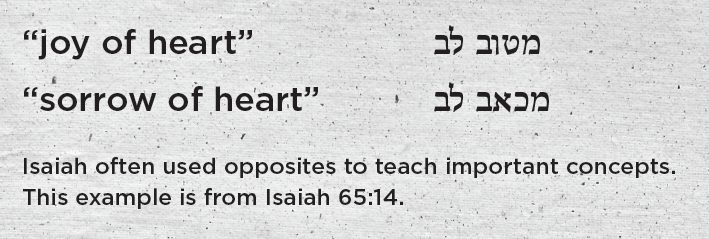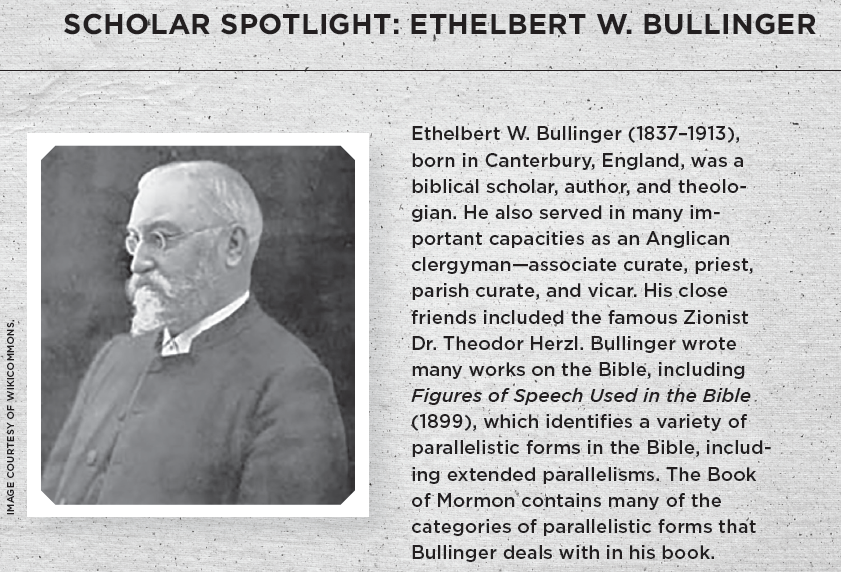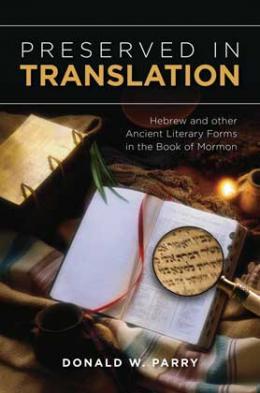Antithetical Parallelism
Donald W. Perry, “Antithetical Parallelism,” in Preserved in Translation: Hebrew and Other Ancient Literary Forms in the Book of Mormon (Provo, UT: Religious Studies Center, Brigham Young University; Salt Lake City: Deseret Book), 19‒22.
"carnally-minded . . . spiritually-minded" (2 Nephi 9:39)
Antithetical parallelism generally consists of two lines and is characterized by an opposition or contrast of thoughts (that is, an antithesis) between two lines.[1] It is a literary form prominent in the Old Testament.[2] One scholar found some 521 instances therein but noted that his count does not include “the almost innumerable antithetic parallelisms in chaps. 10–29 of the book of Proverbs.”[3]
The antithetical parallelism in Isaiah 65:14 contrasts joy of heart with sorrow of heart:
Behold, my servants shall sing for joy of heart,
but ye shall cry for sorrow of heart.

Another example, Proverbs 13:9, differentiates the righteous from the wicked:
The light of the righteous rejoiceth:
but the lamp of the wicked shall be put out.
A common feature that introduces the contrasting element is the word but.[4] This is seen in the two examples above and in the three that follow.
The memory of the just is blessed:
but the name of the wicked shall rot. (Proverbs 10:7)
The fear of man bringeth a snare:
but whoso putteth his trust in the Lord shall be safe. (Proverbs 29:25)

The antithetical parallelisms of the Book of Mormon, like their biblical counterparts, contain rich and varied antonyms.[5] In this first example, swift and slow stand in contrast, as do the expressions to do iniquity and to remember the Lord your God:
Ye are swift to do iniquity
but slow to remember the Lord your God. (1 Nephi 17:45)
In the example that follows, carnally-minded contrasts with spiritually-minded, and death stands opposite of life eternal (note than the clauses are joined by and, not but):
Remember, to be carnally-minded is death,
and to be spiritually-minded is life eternal. (2 Nephi 9:39)
In the next example, temporal is contrasted with spiritual, and carnal mind is antithetical to God (note also the synonymy of temporal/
And I would not that ye think that I know of myself—
not of the temporal but of the spiritual,
not of the carnal mind but of God. (Alma 36:4)

The following two passages, also from the book of Alma, are clearly antithetical without the aid of disjunctive but:
For I say unto you that whatsoever is good cometh from God,
and whatsoever is evil cometh from the devil. (Alma 5:40)
If ye will repent ye shall be saved,
and if ye will not repent, ye shall be cast off at the last day. (Alma 22:6)
Notes
[1] According to E. W. Bullinger, antithetical parallelism is “when words are contrasted in the two or more lines, being opposed in sense the one to the other.” Figures of Speech Used in the Bible, 351.
[2] A sampling of antithetical units in the Bible includes green herb/flesh (Genesis 9:3–4); son/daughter (Exodus 1:16); cut off/raised up (Exodus 9:15–16); worthy man/wickedness (1 Kings 1:52); willing and obedient/refuse and rebel (Isaiah 1:19–20); lofty looks, haughtiness/humbled, and bowed down (Isaiah 2:11); slay the souls/save the souls (Ezekiel 13:19); strengthen/fall down (Ezekiel 30:25); ye are gods/ye shall die like men (Psalm 82:6); and curse/bless (Psalm 109:28).
[3] Krašovec, Antithetic Structure in Biblical Hebrew Poetry, 124; see pp. 124–27. He defines antithetical parallelism on p. 140.
[4] Note that in Hebrew both the conjunction and and the disjunction but are represented by the single character waw.
[5] For several biblical and Book of Mormon examples of antithetical parallelisms, see Parry, Poetic Parallelisms in the Book of Mormon, xxxi–xxxiii. For a list of antithetical parallelisms in the Book of Mormon, see the index of poetic forms on p. 565 (under the entries “antithetical” and “contrasting ideas”). One may also consult Parry, “Teaching in Black and White” and “Antithetical Structure in the Book of Mormon.”
